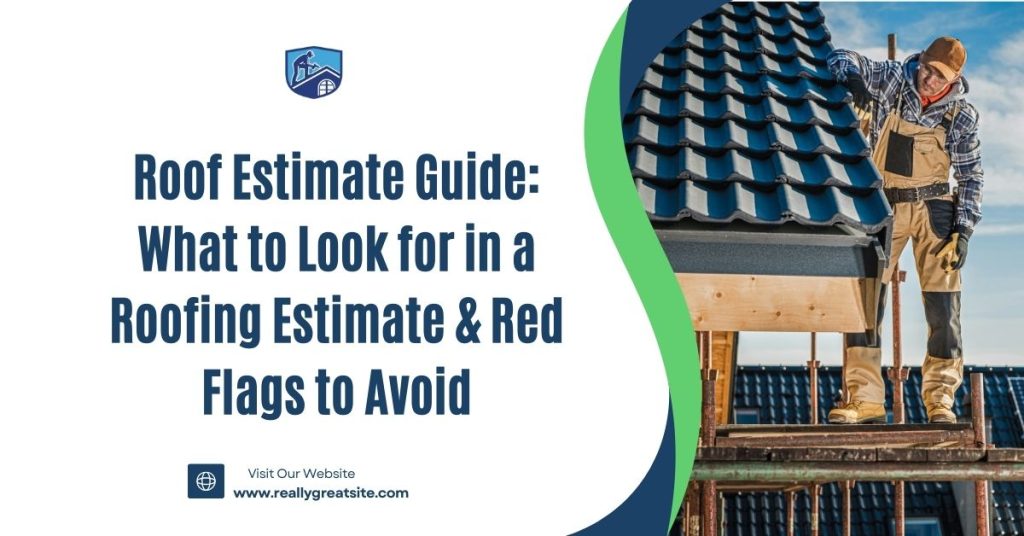A roof estimate is an essential document that outlines the scope, cost, and specifics of your roofing project, whether you need a roof repair, replacement, or a brand-new installation. But not all roof estimates are created equal, and knowing what to look for—and what to avoid—is crucial for homeowners. This article breaks down everything you need to know about reviewing a roofing estimate, highlighting key elements, questions to ask, and common red flags. Whether you’re a homeowner seeking a roof repair or planning for a new roof, this guide will help ensure you get a proper roofing estimate, giving you the peace of mind that you’re making an informed decision.
1. What Is a Roof Estimate and Why Is It Important?
A roof estimate is a detailed proposal that a roofing contractor provides to outline the scope of work, materials, costs, and terms for a roofing project. This document helps homeowners understand the extent of work required, from roof repair to full replacement, and provides a breakdown of the associated costs. An accurate roof estimate is essential because it allows homeowners to assess the project cost, compare different contractors, and avoid unexpected expenses.
2. What Should Be Included in Every Roof Estimate?
A proper roofing estimate should include several key components to ensure clarity and transparency. First, it should outline the materials to be used, specifying if asphalt shingles, metal panels, or other types of roofing materials will be used. Labor costs and any additional fees for things like roof vents, flashing, and permits should also be detailed. Additionally, the estimate should include a timeline, projected start and end dates, and information on warranties covering both materials and workmanship.
3. How Many Estimates Should I Get for My Roofing Project?
When planning a roofing project, it’s advisable to get multiple estimates from different roofing companies. Comparing estimates helps homeowners understand the average costs and identify any potential red flags, such as extremely low bids that could indicate subpar workmanship or low-quality materials. Generally, three estimates provide a solid basis for making an informed decision.
4. Key Items to Look For in a Roofing Estimate
An accurate roofing estimate should provide a clear breakdown of materials, labor costs, and any additional fees. Look for line items detailing the type of shingles, whether the contractor will use roof decking, and if flashings and vents are included. The estimate should also outline any cleanup, waste disposal, or potential extra charges. Ensuring these elements are specified helps avoid disputes over what is included in the roofing project.
5. Red Flags to Look for When Reviewing a Roof Estimate
Not all roofing estimates are created equal, and there are red flags to watch for. A vague or overly simplistic estimate can be a warning sign, as it may indicate a lack of transparency or thoroughness. Beware of contractors who don’t provide specifics on materials, labor costs, or project timelines, as these omissions can lead to unexpected expenses later. Additionally, if the contractor doesn’t offer warranty information, it could be a sign that they’re not confident in the quality of their work.
6. What to Expect in Terms of Roofing Materials
The type and quality of roofing materials play a significant role in the durability and appearance of your roof. A comprehensive roof estimate should specify the brand, type, and grade of materials, whether it’s asphalt shingles, metal, or another material. For instance, high-quality asphalt shingles will typically have a longer lifespan than lower-grade options. Ensure the estimate includes details on flashing and roof decking if replacements are necessary.
7. Is a Warranty Included in the Roofing Estimate?
Warranties are a crucial part of any roofing estimate, providing protection against defects in materials and workmanship. Many reputable roofing companies offer both manufacturer warranties for materials and workmanship warranties for installation. Understanding the warranty terms is vital, as it can save you from unexpected repair costs down the line. If the roofing contractor doesn’t offer a warranty, it may be best to seek another company that stands by their work.
8. Should I Look for Labor Costs in the Estimate?
Labor costs make up a significant portion of the total roofing project cost, so it’s essential to see a clear breakdown in the estimate. These costs vary depending on the complexity of the job, the contractor’s experience, and regional factors. Look for transparency in labor charges to ensure you’re paying a fair price for the work to be done on your roof.
Read More: How much Does a New Roof Cost
9. Common Add-ons and Extras in Roof Estimates
Roofing estimates may include additional services like roof vents, flashing, and roof inspections. These extras are often necessary for ensuring a quality roofing installation, but it’s important to understand each item’s purpose and cost. Ask your contractor to explain any add-ons and ensure they are necessary for your specific roofing project.
10. How to Choose the Right Roofing Contractor Based on Estimates
Once you’ve gathered multiple roofing estimates, take the time to evaluate each contractor based on their reputation, experience, and the clarity of their estimate. Look for contractors who are transparent about their work, offer a detailed line item breakdown, and have positive customer reviews. Choosing a reputable roofing contractor who provides a comprehensive and clear estimate will ensure a successful and satisfactory roofing project.
Key Takeaways
- Get multiple estimates to compare project costs and contractor reliability.
- Check for a clear breakdown of materials, labor costs, and any additional fees in the roof estimate.
- Look for warranties covering both materials and workmanship to protect against future issues.
- Watch for red flags like vague estimates, missing warranty information, or unclear labor costs.
- Choose a reputable roofing contractor with a proven track record and transparent estimate.
Understanding a roof estimate allows homeowners to make confident decisions about their roofing project, ensuring they select the right materials, contractors, and warranties for long-lasting results.






